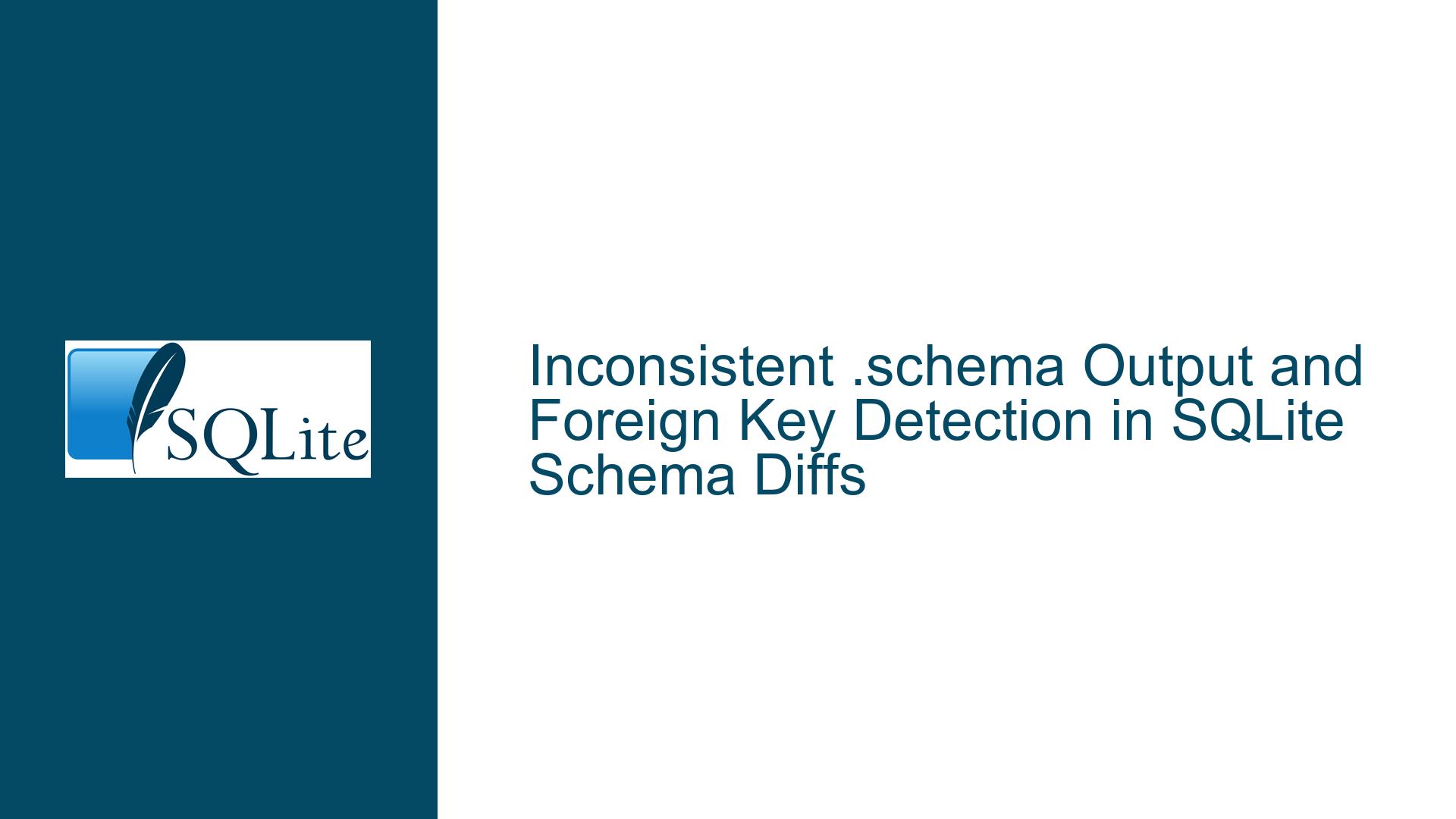Inconsistent .schema Output and Foreign Key Detection in SQLite Schema Diffs
Schema Diffs Affected by Table Ordering and Foreign Key Constraints in SQLite
Understanding Non-Deterministic .schema Output and sqldiff Limitations
The core challenge revolves around comparing schema changes between two SQLite databases when using the .schema command or sqldiff tool. The user observes that:
- Table order differences in
.schemaoutput render textual diffs unreadable. - Foreign key constraint changes are not detected by
sqldiff --schema. - Formatting inconsistencies in schema dumps (e.g., whitespace, comments) complicate comparisons.
This trifecta creates a "schema diff hell" where critical changes (like foreign keys) are masked by superficial discrepancies. The root cause lies in how SQLite stores and retrieves schema definitions.
Key Observations from the Discussion
.schemaoutput order depends on internal storage order and foreign key dependencies, not alphabetical or creation order.sqldiffdoes not compare foreign key constraints or other metadata stored outsidesqlite_schema.sql.- Schema definitions retain original formatting (whitespace, comments), leading to false positives in diffs.
Why Schema Comparisons Fail: Storage Mechanics and Tool Limitations
1. Internal Schema Storage and Retrieval
SQLite stores schema objects in the sqlite_schema table with no guaranteed order. The .schema command outputs entries in the order they are stored, which can change due to:
- Foreign Key Dependencies: Adding a foreign key may reorder dependent tables during schema introspection.
- Vacuum Operations: Rebuilding the database can alter internal object storage order.
- Tooling Differences: GUIs or libraries that modify the database might reorder schema entries.
Example: Two databases with identical schemas but different foreign keys may have .schema outputs ordered differently:
-- Database A (no foreign keys)
CREATE TABLE Orders (id INTEGER PRIMARY KEY, item TEXT);
CREATE TABLE Customers (id INTEGER PRIMARY KEY, name TEXT);
-- Database B (with foreign key)
CREATE TABLE Customers (id INTEGER PRIMARY KEY, name TEXT);
CREATE TABLE Orders (
id INTEGER PRIMARY KEY,
item TEXT,
customer_id INTEGER REFERENCES Customers(id)
);
Here, Customers appears first in Database B due to the foreign key dependency in Orders.
2. sqldiff’s Blind Spots
The sqldiff tool compares sqlite_schema.sql entries verbatim, ignoring:
- Foreign Key Constraints: These are parsed from
sqlite_schema.sqlat runtime and not stored as separate metadata. - Collation Sequences and CHECK Constraints: Similar parsing dependencies apply.
- Comments and Formatting:
sqldifftreats whitespace and comments as significant differences.
If two schemas have identical CREATE TABLE text except for formatting or foreign keys added via ALTER TABLE, sqldiff will report no differences.
3. Schema Definition Variability
- Whitespace Sensitivity: Tools may format
CREATE TABLEstatements differently:CREATE TABLE t(a,b); -- Compact CREATE TABLE t (a, b); -- Space after parenthesis - Comment Retention: SQLite preserves comments in
sqlite_schema.sql, causing mismatches:CREATE TABLE t(id INT); -- Legacy table CREATE TABLE t(id INT); -- Updated 2023 - Implicit Column Types: Columns without explicit types (e.g.,
CREATE TABLE t(id, name)) default toTEXT, but this is not reflected in schema dumps.
Resolving Schema Diff Issues: Custom Queries and Workarounds
Step 1: Generate Deterministic Schema Dumps
Method A: Query sqlite_schema with Explicit Ordering
Use a custom query to dump schema objects in a fixed order (e.g., alphabetical):
SELECT sql || ';'
FROM sqlite_schema
WHERE type IN ('table', 'index', 'view', 'trigger')
ORDER BY name, type;
Redirect this output to a file:
sqlite3 database.db "SELECT sql || ';' FROM sqlite_schema ORDER BY name, type;" > schema.sql
This ensures tables are always ordered alphabetically, regardless of dependencies.
Method B: Normalize Schema Formatting
Use the --indent option in the SQLite CLI to reduce formatting variability:
sqlite3 database.db ".schema --indent" > schema_indented.sql
While not perfect, this collapses most whitespace differences.
Step 2: Compare Foreign Keys and Metadata
Foreign keys are not part of sqlite_schema.sql. Extract them separately using PRAGMAs:
SELECT m.name AS table_name,
p."from", p."to", p."table", p."on_update", p."on_delete"
FROM sqlite_master m
JOIN pragma_foreign_key_list(m.name) p
WHERE m.type = 'table';
Compare this output between databases.
Step 3: Use a Custom Diff Tool
Combine Schema and Metadata: Create a unified schema dump that includes:
- Normalized
CREATEstatements (sorted alphabetically). - Foreign key constraints from
pragma_foreign_key_list. - Indexes and triggers.
Example script:
#!/bin/bash DB=$1 { sqlite3 "$DB" "SELECT sql || ';' FROM sqlite_schema ORDER BY name, type;" sqlite3 "$DB" "SELECT '-- FOREIGN KEY: ' || m.name || '.' || p.\"from\" || ' -> ' || p.\"table\" || '.' || p.\"to\" FROM sqlite_master m JOIN pragma_foreign_key_list(m.name) p WHERE m.type = 'table';" } > "${DB}_schema.txt"- Normalized
Diff with git-diff or Beyond Compare: Configure your diff tool to ignore whitespace:
git diff --ignore-all-space --no-index schema_v1.sql schema_v2.sql
Step 4: Patch sqldiff to Include Foreign Keys
For advanced users, modify sqldiff.c from the SQLite source to include foreign key checks:
- Add Foreign Key Extraction: Use
PRAGMA foreign_key_listin thediff_one_tablefunction. - Compare Constraints: Treat missing/added foreign keys as differences.
Final Workaround: Programmatic Schema Inspection
Use a Python/Ruby script to compare schemas holistically:
import sqlite3
def get_schema(db_path):
conn = sqlite3.connect(db_path)
conn.row_factory = sqlite3.Row
schema = {}
# Tables
tables = conn.execute("SELECT name, sql FROM sqlite_schema WHERE type='table'").fetchall()
for table in tables:
# Foreign keys
fks = conn.execute(f"PRAGMA foreign_key_list({table['name']})").fetchall()
schema[table['name']] = {
'sql': table['sql'],
'foreign_keys': [dict(fk) for fk in fks]
}
conn.close()
return schema
def compare_schemas(schema1, schema2):
# Compare tables, columns, foreign keys...
pass
By addressing schema storage mechanics, leveraging PRAGMAs for metadata, and customizing diff workflows, teams can achieve accurate schema comparisons despite SQLite’s idiosyncrasies.






